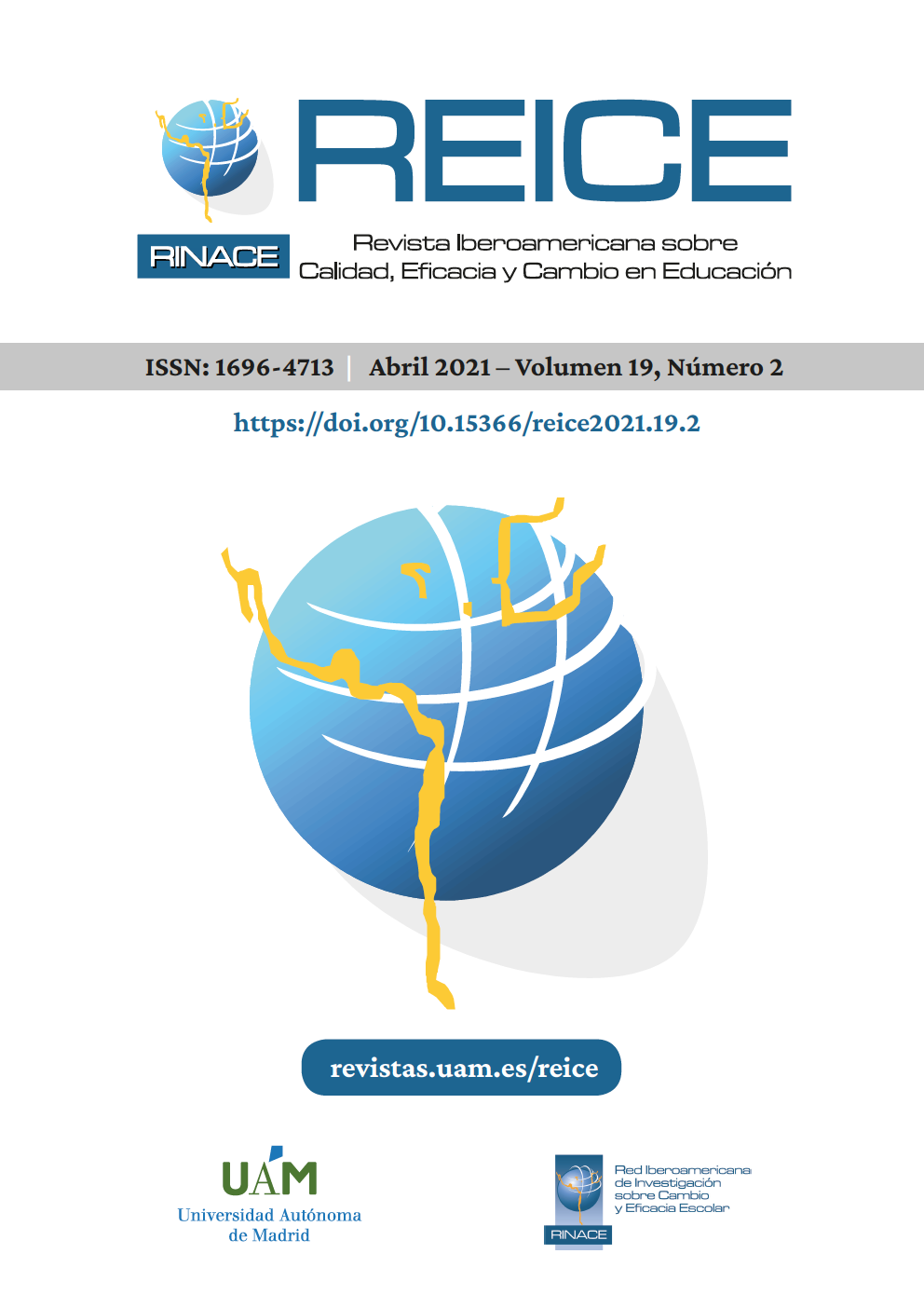Palabras clave:
Sistema educativo, Enseñanzas comunes, Enseñanzas mínimas, Currículo básico, Autonomía pedagógica
Esta obra está bajo una licencia internacional Creative Commons Atribución-NoComercial-SinDerivadas 4.0.
Resumen
La naturaleza del currículo, considerado en el ámbito del sistema educativo, es objeto de atención desde distintos enfoques. Principalmente, con una caracterización formal o analítica del mismo, a partir de un conjunto de elementos propios y reunidos para dar forma a las enseñanzas mínimas o comunes que establecen el currículo básico. Con este punto de partida, el artículo adopta la forma de ensayo teórico para centrar el análisis en el diseño del currículo del sistema educativo español, considerada una panorámica desde la definición de las enseñanzas mínimas hasta la configuración de un currículo básico, con el trasfondo de la autonomía pedagógica. Como resultado principal, se constata, además de la imprecisión o desajuste de las enseñanzas mínimas, una limitación del currículo básico para responder a su genuina naturaleza: garantizar una formación común y la validez de las acreditaciones académicas correspondientes, en el marco de una autonomía pedagógica más declarada que factible. Por tanto, son objeto de discusión: la naturaleza de las enseñanzas que sostienen el currículo básico, la necesidad de una confluencia educativa que facilite acuerdos, al menos, sobre lo básico imprescindible, y la naturaleza condiciones y alcance del ejercicio de la autonomía pedagógica.
Descargas
Citas
Abiétar, M. y Navas A. A. (2017). El sentido de la escolaridad obligatoria como transición o como fin. Profesorado. Revista de Currículum y Formación del Profesorado, 21(4), 75-94.
Assens, M., Carrió, V., Casal, J. D., Gasco, J., Llorente, I. y Saperas, A. (2020). Proyectos interdisciplinarios en secundaria: Una propuesta organizativa y pedagógica desde el contexto, el currículum y la autonomía. Cuadernos de Pedagogía, 505, 44-51.
Angulo, J. F. (1994). ¿A qué llamamos currículum? En J. F. Angulo y N. Blanco (Coords.), Teoría y desarrollo del currículum (pp. 17-29). Aljibe.
Apple, M. (1981). Social structure, ideology and curriculum. En M. Lawn y L. Berton (Eds.), Rethinking curriculum studies (pp. 131-159). Croom Helm.
Apple, M. (1982). Culture and economic reproduction in education. Routledge & Kegan Paul.
Apple, M. (1986). Ideología y currículo. Akal.
Belavi, G. y Murillo, F. J. (2020). Democracia y justicia social en las escuelas: Dimensiones para pensar y mejorar la práctica educativa. REICE. Revista Iberoamericana sobre Calidad, Eficacia y Cambio en Educación, 18(3), 5-28. https://doi.org/10.15366/reice2020.18.3.001
Bloom, B. S. (1956). Taxonomy of educational objectives: Handbook 1. The cognitive domain. David McKay & Co.
Bloom, B. S. (1964). Taxonomy of educational objectives: Volume 2. The affective domain. David McKay & Co.
Bobbitt, F. (1918). The curriculum. Houghton Mifflin.
Bobbitt, F. (1924). How to make a curriculum. Houghton Mifflin.
Bourdieu, P. y Passeron, J. C. (1977). La reproducción. Elementos para una teoría del sistema de enseñanza. Laia.
Casanova, M. A. (2012). El diseño curricular como factor de calidad educativa. REICE. Revista Iberoamericana sobre Calidad, Eficacia y Cambio en Educación, 10(4), 6-20.
Clark, Ch. y Yinger, R. J. (1980). The hidden world of teaching: implications on teacher planning. East Lansing.
Coll, C. (1987). Psicología y currículum. Paidós.
Coll, C. (2006). Lo básico en la educación básica. Reflexiones en torno a la revisión y actualización del currículo de la educación básica. Revista Electrónica de Investigación Educativa, 8(1), 1-17.
Frías, A. S. (2007). El currículo escolar y la descentralización educativa en España. Revista de Educación 343, 199-221.
Gagné, R. M. (1968). Educational technology as technique. En E. Eisner y E. Walance (Eds.), Conflicting conceptions of curriculum (pp. 50-63). McCutchan.
Gimeno, J. (1989). El currículum: una reflexión sobre la práctica. Morata.
Gimeno, J. (2005). La educación obligatoria: su carácter educativo y social. Morata
Gimeno, J. y Pérez Gómez, A. I. (1999). Comprender y transformar la enseñanza. Morata.
Giroux, H. (1981). Ideology, culture and the process of education. Temple University Press.
Giroux, H. (1983). Critical theory and educational practice. Deakin University.
González, T. (2004). Competencias estatales y autonómicas en la determinación del currículo o sobre las enseñanzas mínimas comunes. En VVAA., Informe educativo 2004. Análisis y situación de las Comunidades Autónomas (pp.163-195). Santillana.
Johnson, M. (1967). Definitions and models in curriculum theory. En J. R. Gress y D. E. Purpel (Eds.), Curriculum: An introduction to the field (pp. 469-485). McCutchan.
Kemmis, S. (1988). El currículum: Más allá de la teoría de la reproducción. Morata.
Martínez B. y Rodríguez, E. (2017), Los contenidos del desarrollo profesional docente: Presencias y omisiones. Profesorado. Revisa de Currículum y Formación del Profesorado, 21(3), 41-61.
Penalva, J. (2007). Análisis crítico de los aspectos teóricos del currículum flexible y abierto. Consecuencias educativas. Profesorado. Revista de Currículum y Formación del Profesorado, 11(3), 1-14.
Schön, D. A. (1983). The reflexive practitioner. How professional think in action. Temple Smith.
Schwab, J. J. (1983). Un enfoque práctico como lenguaje para el currículo. En J. Gimeno Sacristán y A. Pérez Gómez (Eds.), La enseñanza: Su teoría y su práctica (pp. 197-209). Akal.
Stenhouse, L. (1987). Investigación y desarrollo del currículo. Morata.
Taba, H. (1974). Elaboración del currículo. Troquel.
Taylor, P. H. y Richards, C. M. (1985). An introduction to curriculum studies. NFER-Nelson.
Tröhler, D. (2017). La historia del currículum como camino real a la investigación educativa internacional. Historia, perspectivas, beneficios y dificultades. Profesorado. Revisa de Currículum y Formación del Profesorado, 21(1), 202-232.
Tyler, R. W. (1973), Principios básicos del currículum. Troquel.
Wheeler, D. K. (1976). El desarrollo del currículum escolar. Santillana.
Zimmer, O. (2003). A contested nation: History, memory and nationalism in Switzerland, 1798-1891. Cambridge University Press.

